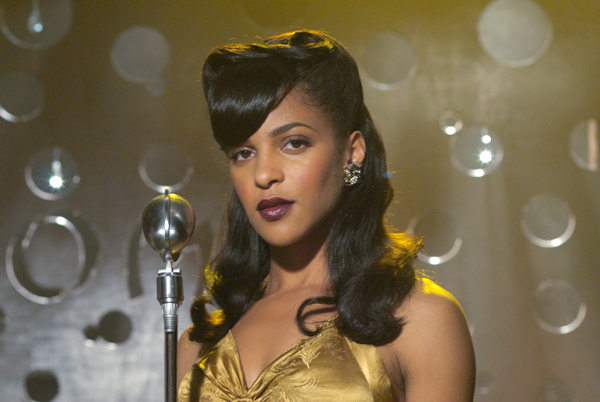|
Reviews of Recent Independent, Foreign, & Documentary Films in Theaters and DVD/Home Video

WHO DO YOU LOVE Who Do You Love opens on an upbeat. In 1955, Bo Diddley (played by guitarist Robert Randolph) is performing his trademark hard-driving riffs at one of DJ Alan Freed’s early rock ‘n’ roll revues in Brooklyn. But as the camera swoops into the wings to focus on recording maestro Leonard Chess (Alessandro Nivola), anyone would be nonplused why he’s so tense and grim. Isn’t the blues supposed to be cathartic and rock ‘n’ roll liberating? This confused dichotomy between historical accuracy and the music continues all through this version of the rise of Chicago’s legendary Chess Records, which brought “race music” to a wider public and helped birth rock ‘n’ roll. With the support of different participants (or their estates) than Darnell Martin‘s highly fictionalized Cadillac Records two years ago, Who Do You Love features more of a biography of Leonard, this time including his relationship with his brother Phil (Jon Abrahams). (A flashback to the brothers’ childhood fascination with a Depression-era blues musician, and his earthily profane vernacular, is one of the few times Leonard actually seems to enjoy the music.) In the 1940’s, the Chess brothers escape from working at their immigrant father’s junkyard to the music at black night clubs. (Nivola pulled off French much better in Coco Before Chanel than his few lines of Yiddish here.) Leonard’s loyal brother tags along, but his wife, Revetta (Marika Dominczyk), can’t even stay awake at these jaunts through jive. Inexplicably, Leonard risks all their combined family finances to open their own nightclub, the Macomba. His tour guide through the world of black music is Willie Dixon, and Chi McBride’s performance gives the songwriter/producer/arranger/bassist his long past due credit in the movies. Dix always makes clear that his tutelage and friendship with the Chess brothers is about their white skin and their money that allows him access to the music business that he can’t reach on his own—he becames a producer. However, Dix dismisses McKinley Morganfield, aka Muddy Waters, as too country, as too fresh from the Delta. (David Oyelowo is earnest but lacks the bluesman’s charisma that inspired the Rolling Stones to name themselves from one of his songs). When Leonard finally lets Muddy record with his own band, the film perks up with real musicians—Keb’ Mo’ as Jimmy Rogers on guitar, and Raheem DeVaughn and Ryan Shaw as more composites than specific real performers. On Muddy’s first tour, his exuberant spirit manages to break through the montage of the usual ‘50’s clichés, including an enthusiastic teen dance where the kids knock over the rope separating blacks from whites (this is not the Deep South). In what is surely an apocryphal but fun scene, the exciting harmonica histrionics of Little Walter (Miko DeFoor) even win over a threatening racist. The many women Leonard is reputed to have bedded are represented by a fictional singer, Ivy Mills. Though she repeatedly performs Etta James’s signature song “At Last,” the skinny as a rail Megalyn Ann Echikunwoke more invokes Billie Holiday on heroin, especially as compared to Beyoncé Knowles’s more earthy, albeit more circumspect, representation in Cadillac Records. This affair sets off a long melodramatic section contrasting Leonard’s financial success against his strained family life. Oddly, Nivola, who was so sexy as a rocker in Laurel Canyon, is just too tense as a lover. That there
are so few joyous musical moments is particularly surprising because
director Jerry Zaks was Tony nominated
for one of the first successful jukeboxicals, Smokey Joe’s Cafe,
which celebrated the pop songs of
Jerry Leiber and Mike Stoller.
However, even though Howlin’ Wolf is only mentioned in passing and Chuck
Berry is absent, those irresistible Bo Diddley beats are given overdue
credit for the transformation of the blues into rock ‘n’ roll, one of Chess Records’ crucial
contributions to popular culture.
Nora Lee Mandel
|

